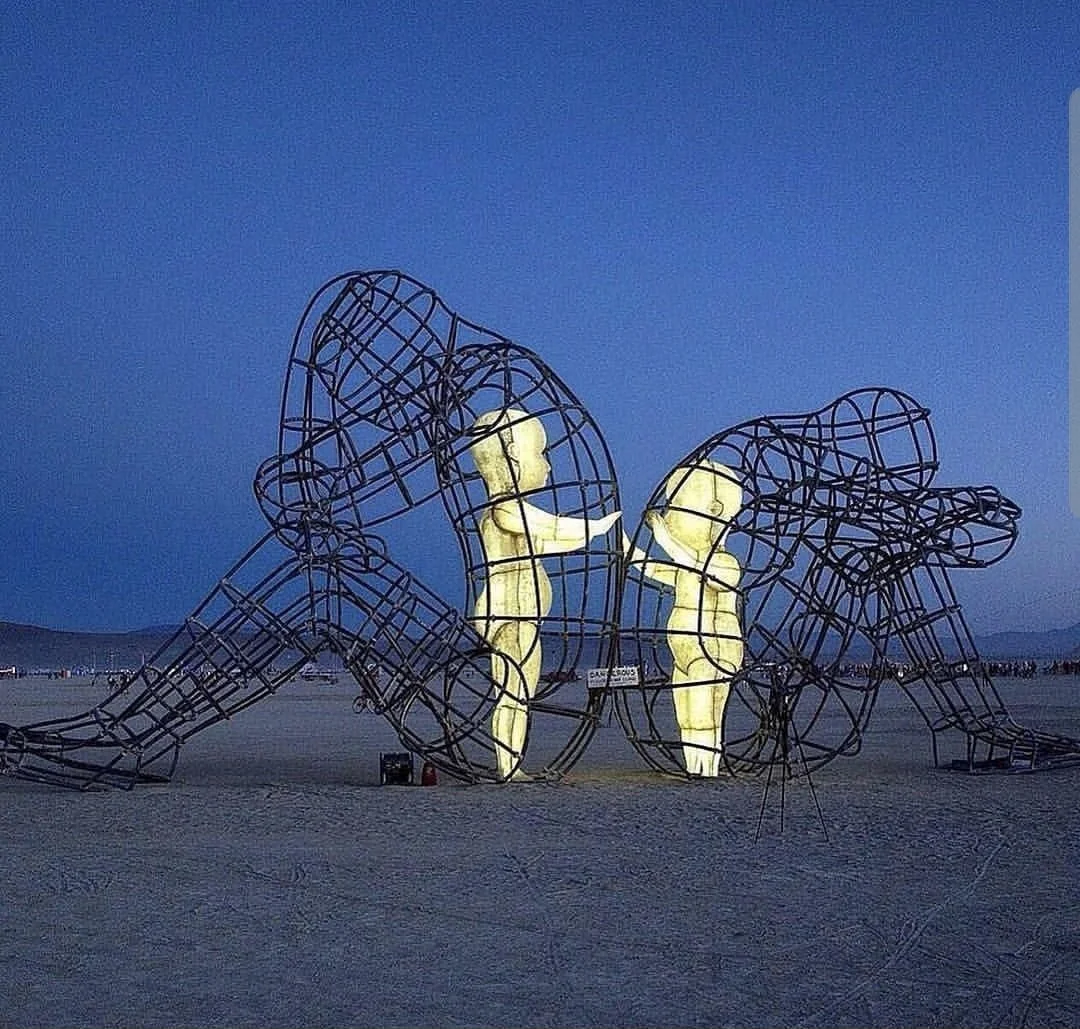Our relationships can be the most fantastic containers for healing our inner child wounding. When we argue with our partners it is not our wise adult self having the argument it is almost always one of our adaptive childhood parts. These are the parts of us that learned very early how to survive emotionally in our families of origin.
When I work with couples through a systemic lens, I can see the recurring patterns that keep looping and generating conflict, alongside each partner’s adaptive child strategies. Once these patterns become visible, they’re impossible to unsee.
We think our fights are about the dishes, about a shutdown after a small comment, about tension around sex. Or maybe it is someone always needing to be right, or to be in control. Maybe it about someone who withdraws in the middle of tension, they clam up and say nothing. There is always something deeper there.
Artist unknown, From Burning Man
Once you see it, it makes a different kind of sense. The fight isn’t about the housework or the small irritations, those are just the signs. What’s really happening is that an adaptive child has taken the lead. The adaptive children are in the house.
It is our adaptive child that runs the fight. The problem with this is our adaptive child has no place running our adult relationships. It doesn’t have the discernment or capacity to make adult decisions.
The adaptive child is the part of us that learned how to stay connected, safe, or invisible in childhood. This is a very intelligent survival strategy that helped us survive when we were a child to stay safe. The only problem is that when this part is running the show in adult relationships, we don’t respond we react.
So when two adaptive children collide, the relationship quickly becomes a battleground rather than a place of safety.
In Terry Real’s framework, there are three common adaptive child imprints that often show up in adult intimacy. These are:
The Hero Child. This is the person who '“holds it all together.” They learned early that love came through competence, responsibility, or emotional caretaking. They took up a particular role in their family system and it was often either, the good one, the achiever, the surrogate spouse, the family therapist or they calmed things down.
They are often very competent, loyal and responsible people in their adult life. They show up, do their job and they do it well. They are often seen by others as competent, logical and good people.
When they are not good, what does that look like?
Well they can be passive sometimes and they are not particuarly good at being vulnerable because they have had to be good and responsible for a very long time. This means surrender, being open and receiving can be really challenging for them.
In adult relationships, this can look like:
Over-functioning
Carrying the emotional load for both partners
Resentment building beneath “being fine”
Struggling to ask for help or show vulnerability
When the Hero Child is activated, they often feel: “If I don’t manage this, everything will fall apart.” When they do eventually explode or withdraw, it often shocks their partner because their exhaustion has been invisible for a long time. The Hero child has had to hold a lot in the family system; in fact, they have probably been given more power than a child should have but it has not been based on them as an individual. It has been based on what the parents needed them to do to regulate the family system.
The Scapegoat Child. The scapegoat is the classic rebel or problem child. They learned that conflict, intensity, or acting out was the only way to stay seen. They often have very big feelings and express all that is not being expressed in the family system. They might be the person who fights with one of the parents all the time. Maybe the overbearing parent. They are often overtly or covertly shamed, being seen as the source of all the problems in the family.
In adult relationships, this can show up as:
Anger that feels bigger and disproportionate to the moment
Defensiveness or blaming
A sense of being misunderstood or unfairly criticised
Feeling chronically “wrong” or rejected
Underneath the reactivity is often a deep fear; fear that they are going to be shamed again. Often the whole family system can be organised around keeping this child in line. So they seem to carry a lot of power because everyone is walking around on egg shells around them. In some ways, they are the truth teller of what is not being expressed.
This child fights not to win but to protect against collapse. They are very emotional and often have big hearts. They are the rebels and the creatives of the world. Sometimes the bad boys. Why do we love the bad boys; because they have big hearts.
The Lost Child. The lost child runs their own race. Behind it is the belief, “If I disappear, I’ll be safe.”
The Lost Child adapted by minimising needs, emotions, and presence. The core wound here is often abandonment and that was learned early when this child went to their parent for co-regulation and they learned quickly that that was not available so they become independent and walled off as they have had to regulate themselves. They went and hid in their bedroom.
In adult relationships, this often looks like:
Withdrawal or emotional shutdown
Avoidance of conflict
Difficulty expressing wants or desires
A partner feeling shut out or alone
The Lost Child’s strategy isn’t disinterest, it’s self-protection. Their nervous system learned very early that connection is overwhelming or unsafe. There are lots of repressed emotions here because growing up there was no one they felt safe enough to be with to express how they were feeling.
When we eventually find a partner, the person we want to commit to, we often pick a partner that enables us to predictably repeat our role. Hence they saying ‘we marry our unfinished business’. We pair off with people who mirror the experience we received from our parents/caregivers so we can finally heal that pattern.
Why do fights often escalate so fast?
Here’s the key piece, when we are fighting from our adaptive child, we cannot access our Wise Adult self because our pre-frontal cortex, the part of our brain responsible for logical and rational thought, goes offline. We go into a survival response, our limbic system comes online and all our early adaptive patterns are alive and ready to go.
When we can stay in the Wise Adult part of ourselves we;
Can stay present
Can hold complexity
Can self-soothe
Can take responsibility without collapsing or attacking
But the adaptive child doesn’t have that capacity. Instead, the nervous system is organised around threat, survival and attachment loss. So the fight isn’t about the content. It is about our old unmet needs colliding in the present.
Two children are trying to feel safe, using strategies that once worked, but now damage intimacy. Our adaptive child strategies rarely serve us well in our adult relationships.
From Fighting to Repair
The work of adult relationship healing isn’t about erasing these parts. It’s about learning to:
Recognise when your adaptive child is running the interaction
Learning how to self soothe so that you can pause before responding
Build the capacity to come back online as your Wise Adult
Speak from the present rather than the past
This is deep nervous-system work. Because you can’t “think” your way out of an adaptive state.
You have to feel your way back into safety first. Only then can true repair happen.
The Quiet Shift That Changes Everything
When couples can see that this isn’t you versus me, but younger parts trying to keep us safe, the nervous system settles. Defensiveness eases, blame falls away, and curiosity makes space for compassion, for ourselves and for one another.
Very slowly, the relationship becomes less about winning or withdrawing and more about learning how to stay connected, even when it’s hard.
Here are some reflection questions for you to sit with.
When conflict arises in my relationship, what do I notice happening in my body first?
Do I tend to move toward fixing, fighting, or disappearing when things feel tense?
Which adaptive child strategy do you recognise most easily in yourself; the Hero, the Scapegoat, or the Lost Child? Do you see see a combination of two or maybe that you as you have matured you have moved from one to another?
What familiar loop do my partner and I seem to fall into when we’re under stress?
If this pattern had a job, what might it be trying to protect?
What old story or fear might be getting activated beneath the surface of our current conflict?







